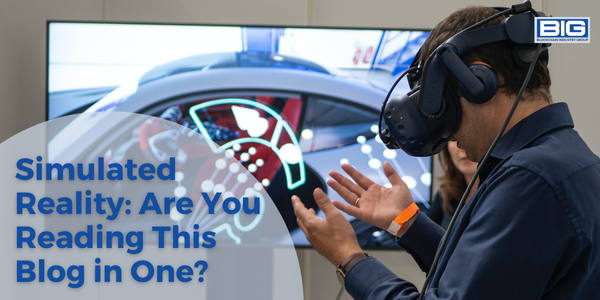
Let’s discuss first our common conceptions and understanding of simulations and simulated worlds.
A simulated world is a virtual environment that is designed to mimic the features and characteristics of the real world. These simulated worlds can be created using various technologies, such as computer graphics, virtual reality, and artificial intelligence, and they are often used for a wide range of purposes, including entertainment, education, and scientific research.
Simulated worlds have long fascinated humans, and the concept of living in a simulated reality has been explored in science fiction literature and films for decades. One reason that simulated worlds fascinate us is the idea that they allow us to experience worlds and scenarios that are beyond our current capabilities or limitations. For example, simulated worlds can allow us to visit distant planets, interact with intelligent life forms, or explore fantastical landscapes and environments.
Another reason that simulated worlds fascinate us is the potential they hold for advancing our understanding of the real world. By creating simulated environments that mimic the features and characteristics of the real world, we can test hypotheses and theories in a controlled and repeatable manner. This can be particularly useful in fields such as physics, biology, and psychology, where it is often difficult to study phenomena in the real world due to the complexity and variability of the environment.
Simulated worlds also have the potential to revolutionize the way we live and interact with one another. For example, virtual reality technologies are already being used to create immersive social environments that allow people to interact with one another in a virtual setting. This has the potential to bring people together from all around the world and facilitate new forms of social interaction and communication.
Finally, simulated worlds also fascinate us because they raise philosophical questions about the nature of reality and our place in the universe. The idea that we may be living in a simulated reality forces us to consider the possibility that our perceptions of the world around us may be based on a constructed set of rules and regulations, rather than an objective reality. This can be a challenging and unsettling concept, but it is also one that has the potential to deepen our understanding of ourselves and the world we live in.
But, perhaps, we are already living in a simulation
Here are five of the most compelling arguments that we are living in a simulation:
- The fine-tuning of the universe: One argument that suggests we are living in a simulation is the fine-tuning of the universe. The fundamental constants and laws of the universe seem to be perfectly balanced in a way that allows for the existence of complex life. This has led some to suggest that the universe may be the product of design, and that we are living in a simulated reality created by a more advanced civilization.
- The role of consciousness: Another argument that suggests we are living in a simulation is the role of consciousness. Despite decades of research, scientists have yet to fully understand the nature of consciousness and how it arises from the physical matter of the brain. Some have argued that the complexity and intricacy of consciousness is more consistent with the idea that it is a product of a simulated reality, rather than a natural phenomenon.
- The quantum world: Another argument that suggests we are living in a simulation is the strange and seemingly random nature of the quantum world. At the subatomic level, the behavior of particles seems to defy the laws of classical physics and appears to be governed by random chance. This has led some to argue that the quantum world is a product of a simulated reality, rather than a fundamental aspect of the universe.
- The possibility of artificial intelligence: Another argument that suggests we are living in a simulation is the possibility of artificial intelligence. As our understanding of artificial intelligence continues to advance, it is becoming increasingly likely that we will one day be able to create intelligent beings that are indistinguishable from humans. If this is the case, it is possible that we are ourselves the products of an artificial intelligence, and that our reality is a simulated one.
- The concept of a multiverse: Finally, another argument that suggests we are living in a simulation is the concept of a multiverse. Some theories suggest that our universe is just one of an infinite number of parallel universes, and that we may be living in one of these universes. If this is the case, it is possible that our universe is a simulated one created by another civilization in a different universe.
The Dark Side of Progress: 15 Dystopian Futures
—
The Fun of Being a Reluctant Grown-Up
—
The Future of Democracy: Virtual Politicians
In conclusion, while the idea of living in a simulation may seem far-fetched, there are a number of arguments that suggest it is a possibility. From the fine-tuning of the universe and the role of consciousness, to the quantum world and the possibility of artificial intelligence, there are many compelling reasons to consider the idea that we are living in a simulated reality. Whether or not this is ultimately proven to be true remains to be seen, but the possibility is certainly intriguing.



